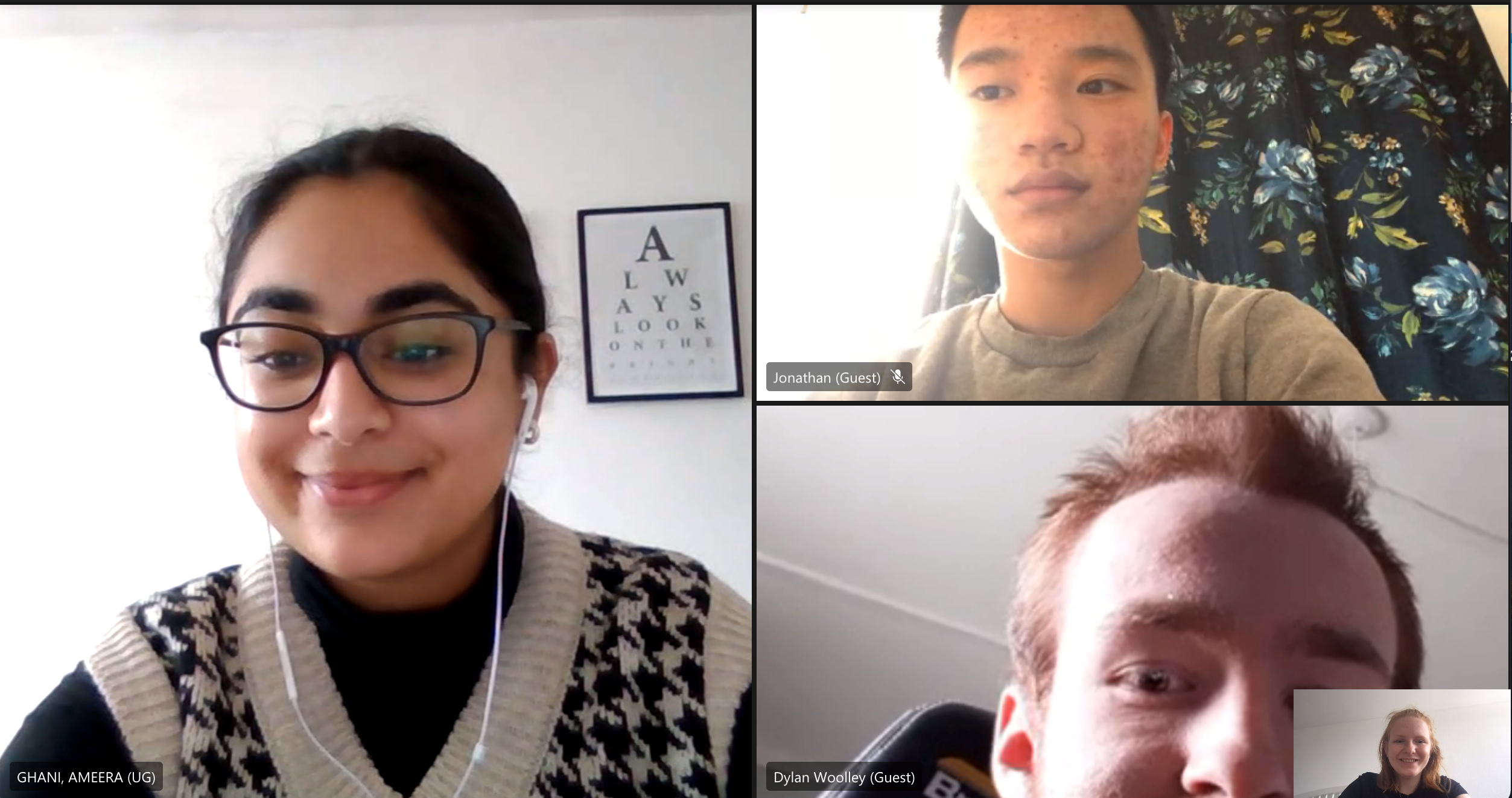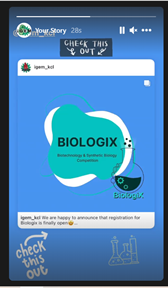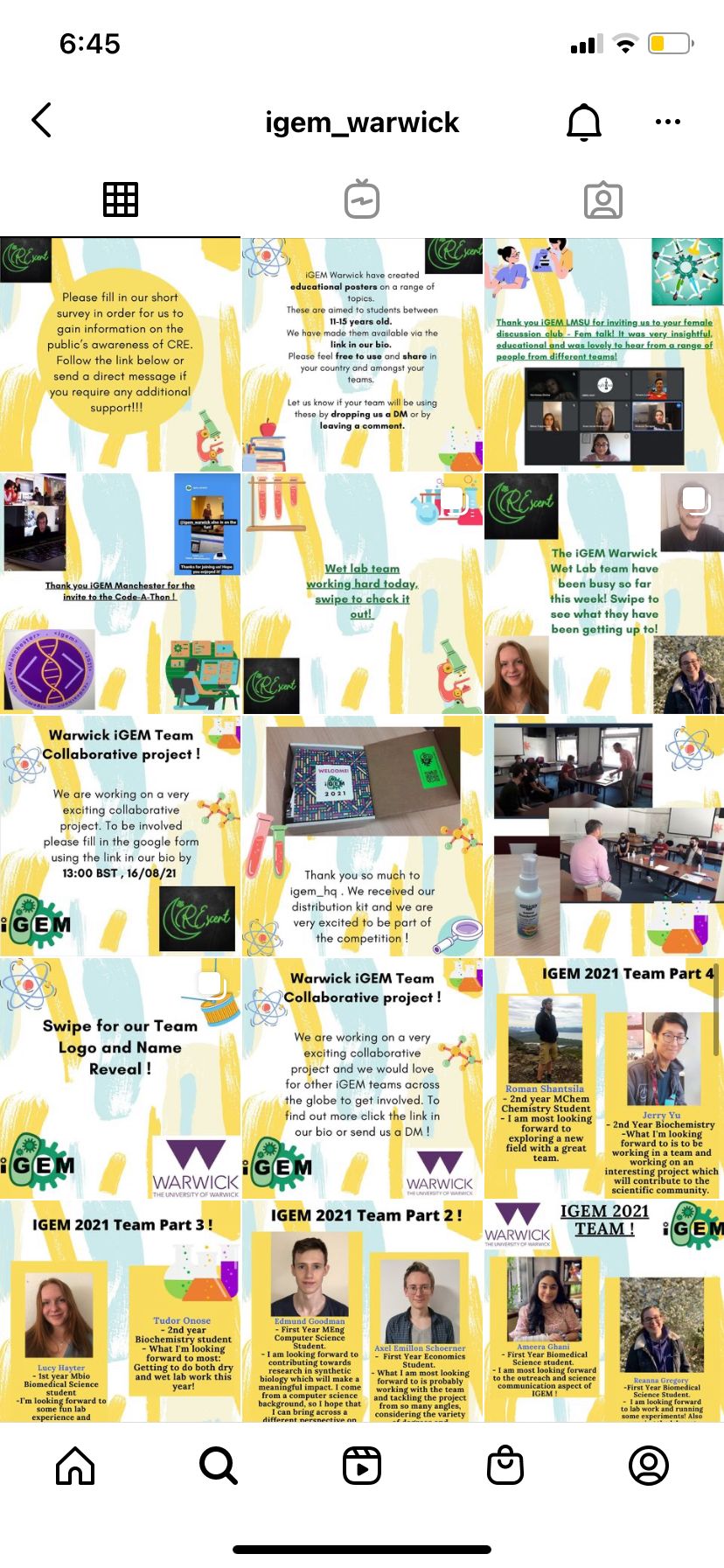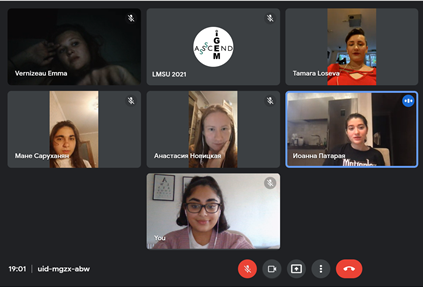Education is a key aspect of iGEM Warwick’s work this year. The importance of sharing knowledge, creating resources, and educating the next generation of students on the vast array of topics within Synthetic Biology is paramount.
Our aim was exactly that, to create educational resources to share knowledge and teach others about the field of Synthetic Biology. We believed the best way to do this was to create an IGEM Collective Magazine which would contain entries from a range of iGEM teams globally describing their project, the importance of synthetic biology to their project, the impact of their project and a research task. We wanted to introduce to students 16–18-year-olds who would be embarking on their KS5 qualification (pre university), the vast application synthetic biology has and the solutions it can create to aid the current real-world issues. With the wide breadth of IGEM teams who submitted unique tasks, the magazine allows students to further develop their knowledge on a wide range of synthetic biology topics. The free flow nature of the magazine encourages independent learning and allows students to research the topics that interest them the most. We believe this encourages students to pursue their own passion while experiencing self-driven study which lays the groundwork for higher level education.
IGEM Warwick initially reached out to IGEM teams via a campaign on social media platforms including Facebook, Twitter, Instagram. We created a google form which contained 4 questions for teams to complete which was made available via our social media platforms and by direct request. We collated the information from the forms and dedicated a page to each team in the booklet and simplified some terms and description in order to adapt it to our target audience (16–18-year-olds). We included a brief introduction page describing iGEM , synthetic biology and aim of the booklet furthermore we also had a tracker page where students could highlight each IGEM team name when they have completed their task. At the end of the booklet there was a certificate of achievement which the student can fill in themselves as evidence that they have completed the research tasks in the booklet. This booklet was distributed to widening participation school in and around Coventry which is the city the University of Warwick is based in. It was made available to teachers in school via a monthly newsletter created by the Outreach team at the department of Science, Engineering and Maths and is also available to access on their website.
A second version of the booklet was created which was unedited therefore was not simplified and was made available to members of BIOSOC (University of Warwick Life Sciences Society). This was made available on their website alongside an article on aim of booklet and iGEM overall. Research and Internships | Warwick BioSoc
The booklet was also distributed to all teams which participated so they could share the resource in their country and with schools local to their university.
Overall, the booklet contained entries from 20 teams over the 3 different continents (Asia, Europe, North America).
The importance of sharing knowledge and providing support for the next cohort of university of students was another important educational aspect to iGEM Warwick. Therefore, we contacted Nuffield Foundation to express an interest in hosting students (16–18-year-olds) to complete a research project with iGEM Warwick. We were able to host 2 students in July for 2 weeks to assist them on their research essay and research poster. As this was their first introduction to academic writing and posters in this manner, we hosted biweekly meetings as well as extra meetings if needed to assist them in the process. This included helping them to understand scientific terminology they have not come across before in research papers, introducing them to referencing and the basic backbone of a research paper as well as advising them on where to find resources. We also attended presentations given by our primary PI Dr Christopher Corre on different topics they could base their research on, including antibiotic resistance and natural sunscreens based on marine life. We also hosted presentations on different iGEM Warwick team projects from 2016-2021 to allow them to start exploring the range of applications Synthetic Biology has and what area they may want to focus their research on.

A meeting with the Nuffield placement students
Using our social media pages such as Instagram we spread the awareness of other IGEM Team educational projects such as iGEM KCL and we also made available via our social media pages educational posters.
From early March we decided to use social media to gain advice and knowledge on our project idea as well as use it as a platform to network with a range of iGEM teams globally. We had from June – August virtual meetups to discuss our project development and ideas with teams such as iGEM KCL, iGEM Mingdao, iGEM Stonybrook to name a few.

A social media story for outreach on Instagram
We gained useful insights into how to improve our wiki as well which direction to go in when working on human practices and the type of individuals we should contact which we acted on. Furthermore, through our social media pages we were able to be involved in many collaborative projects such as in June with McMaster iGEM team where we worked with them on an educational song to iGEM Aix Marseille in September for their emoji project game on Instagram where we shared details of our project on their social media platforms.

A picture of the Warwick 2021 iGEM Instagram feed
At iGEM Warwick we created educational posters on different topics such as Microorganisms in hospitals, PCR, Carbapenem resistance Enterobacteriaceae and ethics in synthetic biology. This was made available by filling out a google form via a link on our social media pages for teams to provide their email address in order for us to send the posters to them. This will allow them to have access the poster in PDF form in English for them use in their own educational campaigns when working with schools or to send to schools and teachers to distribute to their students. The posters are basic introductions in to topics with short bursts of information in order for it to be easier to understand by our target audience which is 11-15 years old.
A carousel of the posters designed
Our aim for education was to make synthetic biology knowledge accessible to a wide range of students at different stages of their academic learning. We believe we have achieved this by using posters, booklets, social media and by hosting students personally as well as involving a range of iGEM teams so that they can also further spread the resources and knowledge of biology and the topic of synthetic Biology even further in their own countries.
LMSU hosted a Fem club talk and invited those who identified as Female from iGEM Warwick Team to attend. In the talk we discussed our projects, issues females face working in science how our countries are working towards tackling issues females face as well as improving inclusivity of females in STEM fields and opportunities for females to work and study STEM. We went through issues faced by females in the UK, Switzerland and Russia as well as solutions and changes occurring. This was a fantastic opportunity to learn more from different teams about educational opportunities for females, as well as share ideas on what should be done to make STEM fields more open to females.

A meeting of the LMSU FEM club
iGEM Warwick were invited on the 30th of September to present in front of the new 1st year Life sciences cohort at the University of Warwick about the iGEM Competition and our project for 2021. We prepared a presentation prior to the date and presented virtually through Microsoft teams. The aim was to introduce the competition to students and encourage them to get involved with iGEM, as well as explain our project this year, ranging from the lab and modelling work to the outreach and collaboration work we accomplished. We wanted to show them all the aspects which make up the iGEM competition and the range of topics present in the field of Synthetic Biology. The students had not been exposed to Synthetic Biology nor iGEM and so the intention of our presentation was to give them a taste of the wonderful world of Synthetic Biology and iGEM. Hopefully this helped develop curiosity towards Synthetic Biology and perhaps encouraged them to consider the possibility of working within the field in the future.